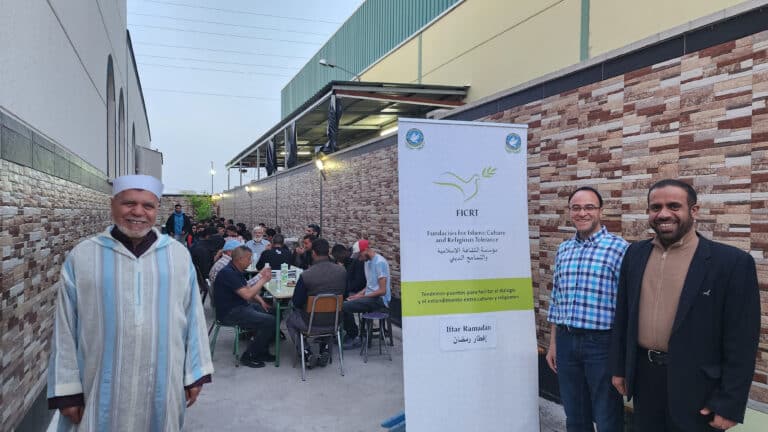During the previous entries we have presented voices, institutions and projects that, from international organizations (UNESCO, the United Nations Educational, Scientific and Cultural Organization ![]() ) or religious traditions (such as Catholicism and Islam, Buddhism or Christianity in general).
) or religious traditions (such as Catholicism and Islam, Buddhism or Christianity in general). ![]() are promoting tolerance on a global level. However, in our journey through tolerance there is a space that cannot be forgotten. Throughout history -and today- universities, writers and cultural creators have been fundamental to the construction of a more tolerant and fraternal world. This is how we recognize it from the Foundation for Islamic Culture and Religious Tolerance and, therefore, we promote and organize “conferences, lectures and cultural programs, studies and publications, meetings and exhibitions, with the purpose of achieving sustainable tolerance and cultural coexistence through cooperation and respect for cultural diversity”, as we point out in our 2019 Activities Report.
are promoting tolerance on a global level. However, in our journey through tolerance there is a space that cannot be forgotten. Throughout history -and today- universities, writers and cultural creators have been fundamental to the construction of a more tolerant and fraternal world. This is how we recognize it from the Foundation for Islamic Culture and Religious Tolerance and, therefore, we promote and organize “conferences, lectures and cultural programs, studies and publications, meetings and exhibitions, with the purpose of achieving sustainable tolerance and cultural coexistence through cooperation and respect for cultural diversity”, as we point out in our 2019 Activities Report.
Today we would like to dedicate our entry to one of the most authoritative scholars of religions at the international level and one who has worked hardest for dialogue between the different confessions: Karen Armstrong (born in the United Kingdom in 1944). As a result of a life devoted to the study of religion, Karen Armstrong has produced a series of publications that have helped to deepen the knowledge of the different religious traditions through their cultural legacy, as exemplified in her work History of Jerusalem; the inquiry into the divinity in the different monotheistic traditions, mainly collected in the work A History of God, or the study of the prophets and the fundamental characters of the different religions of the world, highlighting in this regard the book Muhammad: Biography of the Prophet.
In her different works, Karen Armstrong has always combined academic and intellectual rigor with a clear desire to disseminate, which has made her reflections accessible to a wider public. Thus, in 2008 he presented and won that year’s edition of the famous TED Talks, with a presentation in which he defended – based on his deep knowledge of different religious traditions – the need for “a charter for compassion” that would be common to all faiths and subscribed to by different secular and religious voices. This Charter, which was subsequently developed and is available on the internet ![]() has served as a starting point for various initiatives in favor of tolerance and dialogue between cultures and religions. It is worthwhile to extract a paragraph from the “Letter of Compassion”, in which a clear appeal is made to interreligious dialogue and the need for tolerance as an approach to diversity:
has served as a starting point for various initiatives in favor of tolerance and dialogue between cultures and religions. It is worthwhile to extract a paragraph from the “Letter of Compassion”, in which a clear appeal is made to interreligious dialogue and the need for tolerance as an approach to diversity:
The principle of compassion remains at the heart of all religious, ethical and spiritual traditions, and always asks us to treat others as we would like to be treated. Compassion impels us to work tirelessly to alleviate the suffering of our fellow human beings; it motivates us to put aside selfishness and learn to share and asks us to honor the inviolable sanctity of every human being, treating everyone, without exception, with absolute justice, equity and respect.
The work of Karen Armstrong, a 2017 recipient of the Princess of Asturias Award for Social Sciences, continues today. And this same year 2020 he has published his latest book, The Lost Art of the Scriptures, an essential text for all those who want to continue delving into the legacy of the different religious traditions.
In this work, Armstrong takes a journey through the history of religions starting from three geographical points: Israel, India and China. These scenarios are expanded throughout the pages and populated with the main religions of the world: Hinduism, Confucianism, Taoism, Buddhism, Jainism, Judaism, Christianity, Islam, etc., of which he explains their origin and chronological evolution. However, the journey proposed by the author is not a “standard” story. Armstrong explores the past of religions based on concepts that – in one way or another – have appeared in all religions throughout history: empathy, recitation, ineffability, the unknown, the importance of recitation, etc.
After discovering how these concepts are found in all religious traditions, Karen Armstrong addresses the relationship between modernity and the various religions to the challenges of the present. In the last pages of the book, the author quotes Sura Al Hujurat (49.13) of the Koran to refer to the diversity of cultures and religions in the world, which constitutes an enriching factor for the path of knowledge of others and tolerance.
“O mankind, we have created you all from one man and one woman, and have arranged you into tribes and nations that you may know one another” (p. 482).







